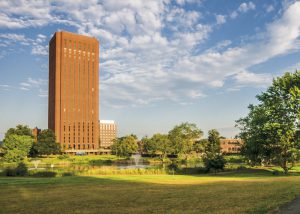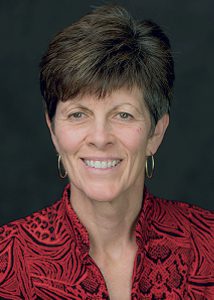PARTNERING WITH UNIVERSITIES

PARTNERING WITH UNIVERSITIES
Arbella Insurance and the Isenberg School of Management at UMass Amherst create insurance competition for undergrad business students
By Christopher W. Cook

UMass Amherst’s W.E.B. Dubois Library is the second tallest library in the world.
We’ve heard the terms “Great Resignation” and “talent crisis” quite a bit lately. And with an ever-growing need for workers in the insurance industry, especially with Baby Boomers reaching retirement age, what can be done to attract new talent to what many consider to be a “not so glamorous” career?
A good idea is to educate about insurance and educate early—especially to college students during their early undergraduate years. With university programs in risk management and insurance picking up momentum, insurance agencies and firms can partner with schools to offer a well-rounded experience to introduce students to the many paths that a career in insurance can offer.
This is what Arbella Insurance Group, headquartered in Quincy, Massachusetts, has done with the University of Massachusetts Amherst.
“The Arbella Insurance Group prides itself on being a member of the community and supporting the communities of our team members,” says Jim Hyatt, the firm’s executive vice president. “I am a proud UMass Amherst Isenberg School of Management alumnus and I’m always thinking about ways to connect with our local institutions to help foster the next generation of leaders for the insurance industry.
“It was a natural fit to join forces with the Isenberg School of Management,” he adds. “Witnessing the genuine excitement from the young students colliding with the passion of our team members is truly a sight to see.”

“It was a natural fit to join forces with the Isenberg School of Management. Witnessing the genuine excitement from the young students colliding with the passion of our team members is truly a sight to see.”
—Jim Hyatt
Executive Vice President
Arbella Insurance
The partnership began around five years ago after UMass Amherst started offering insurance in its curriculum. Once the insurance program “gained moment-um in 2021 and 2022, our first initiative, the Insurance Academy, launched this past spring,” Hyatt says. “A 2022 Insurance Project Challenge involved all 1,000 freshmen in the Isenberg Business School, with the students being split into small groups and being asked to solve one of four real-life insurance challenges. The goal of the collaboration was to expose students to the industry early on to help them map out a possible career path. It has been an amazing experience and partnership so far.”
Hyatt, who graduated from the Isenberg School of Management with a degree in finance, developed the Project Challenge alongside Anne Massey, dean of the UMass Amherst Isenberg School of Management. Massey says, “Jim secured three other firms—Liberty Mutual, Hanover, and Travelers—who pro-vided compelling industry issues for the students to research as part of the challenge, and representatives served on the panel of judges that chose the winning presentations.”
“Assistant Dean Holly Lawrence, OCS, and Bob Bowse, director of the Business Communication Program, are the faculty leads overseeing Isenberg’s Transitions Seminar (a requirement for first-year students at the business school) and the execution of the competition.”
Joining Hyatt and Dean Massey as the final presentation judges were Emily Hughes, vice president and manager of underwriting strategy and performance with Global Risk Solutions at Liberty Mutual; Mike Lewis, vice president of corporate strategy at The Hanover; and Allison Torres, assistant vice president for business technology operations at Travelers—all three are alumni of UMass Amherst.
“Liberty Mutual, Travelers and The Hanover Group supported the competition as judges and also brought real-world insights to the table that will help develop and build out the Insurance Academy in the semesters to come,” adds Hyatt. “Collaborations like this will help the industry as it continues to grow over the next decade.”
Insurance Academy
With the academy, Massey says, “students can learn about the [insurance] industry and gain valuable skills. They will learn about and visit companies in the insurance industry, network with industry people, and gain an understanding of trends in the industry. Other learning opportunities include industry/company-based consulting projects and case competitions.

“To be successful, we will seek industry partners who will provide time and resources to the Academy. In turn, they get great access to our students.”
—Anne Massey
Dean, Isenberg School of Management
University of Massachusetts Amherst
“Collectively, all these activities grow interest in the industry and most important, when students interview for internships and jobs, they will have a unique experience to show recruiters what they can bring to a position.
“The Insurance Academy is in its infancy, and we are still working out the details, but the 2022 Insurance Challenge, which launched in our first-year Transitions seminar, was a key first step to establishing the Academy,” she adds.
Students were assigned to sections/classes capped at 25 participants that were led by teaching assistants (TAs), who are Isenberg juniors and seniors.
“Working closely with our insurance partners, Holly and Bob created four project challenges that were grounded in real issues in the insurance industry,” Massey says. “Within each class, students were divided randomly into four groups, and each group was assigned one of the challenges to respond to. We put student groups through competitive rounds, with the first round taking place in their classes and being judged by the TAs. Top responses for each challenge advanced to a second round and were judged by MBA Fellows.”
The four winning teams advanced to a third and final round, where one student group per challenge competed for cash prizes, which varied based on finishing position (first through fourth).
“It was a huge success and generated a lot of excitement from students who are getting the chance to make real-world connections very early on in their college careers,” Hyatt says. “Students don’t often get to experience the tangible aspects of their studies until they participate in internships, which typically don’t happen until their later years.
“The complex challenges showed students how important insurance is in everyday life. Many students [who participated] think the industry is one they’d be interested in working in someday.
“The project was also a great opportunity for students to network with insurance industry leaders. It was extremely rewarding for our folks to connect with students and give back to these young leaders of tomorrow.
“More challenges and initiatives will be coming online once the fall semester gets underway,” Hyatt continues. “The academy will also grow in the coming semesters to include field trips to insurance companies, classes in insurance, relevant certifications in the industry—possibly including an academic certification—access to special guests and speakers on campus and internships.”
Massey adds: “At Isenberg, we believe experiences develop competencies which, in turn, lead to confidence. Experiences like the case competition, particularly for first-year students, are a huge confidence builder. These students are working in a team on a real industry problem or opportunity, conducting research, formulating a set of recommendations, and then presenting to a panel of industry judges.
“To be successful, we will seek industry partners who will provide time and resources to the Academy. In turn, they get great access to our students.”
Where to begin?
Doesn’t access to university students learning about and becoming interested in risk management and insurance sound ideal in times like these? What can your firm do now to prepare for a similar partnership in the future?
Massey recommends the following:
- Determine what the career goals are for the partnership, such as internships, exposure to different career paths within the industry, and field trips to companies
- Designate a primary point person or contact from each side, i.e., one from the university and one from your firm, to keep things moving
- Identify a departmental home for the academic elements of the partnership, such as classes and/or certifications
- Develop a case competition to generate interest and increase exposure to real-world challenges in the industry
- Allow a year or more to test, refine, and solidify main objectives of the partnership
“The relationship between a university and the insurance industry is mutually beneficial and critical to creating a pipeline of future talent,” adds Hyatt. “It is critical that the insurance professional form a strong partnership with the right people at the college or university from the beginning.
“The first step is to connect with the business school contact from your alma mater or a local/regional college or university to understand what insurance classes or programs are being offered, if any. Check their website to review course listings and any business-related student clubs or organizations.
“Reach out to the business school’s dean for an initial conversation to gauge the interest and determine if resources could be made available for this kind of initiative. The virtual world we now live in makes it extremely easy to connect. Educate the dean on the [insurance] industry and how stable it is and discuss the many available jobs and successful career paths. If both parties are aligned, planning meetings should be scheduled.
“It is important to start small and map out some realistic programs, events and networking opportunities,” he continues. “The insurance professional should reach out to their own network of industry leaders to see which insurers may already be recruiting at the school, if any. Most professionals are happy to support a partnership like this but often don’t know how to get involved.
“Once the parameters of the partnership are set, the university should now be able to drive the program and raise awareness through its internal communication tools, including departmental newsletters, emails and word of mouth. If all goes well, the students will gain valuable, real-world experience and industry insights, and will be able to make connections with insurance professionals looking to hire for internship programs or for placement after graduation,” Hyatt concludes.











